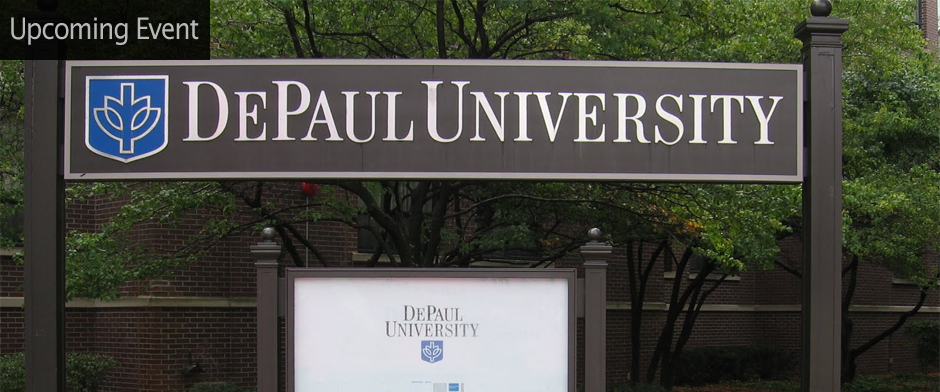What: DEPAUL JOURNAL OF SPORTS LAW & CONTEMPORARY PROBLEMS 2012 Symposium – MONEY & SPORTS: ECONOMIC REALITIES OF BEING AN ATHLETE
When: Friday, March 2, 2012 from 9 a.m. to 12:15 p.m. (Networking: 12:15 p.m. – 1:30 p.m.)
Where: Room 8005 of the DePaul Center, located at 1 East Jackson Blvd, Chicago, IL 60604-2287
9:00 – 9:05 AM Symposium Welcome – Anuolu Fasoranti, Editor-in-Chief, DePaul Journal of Sports Law and Contemporary Problems
9:05 – 9:45 AM PANEL I: ECONOMIC REALITIES/ISSUES OLYMPIC ATHLETES ENCOUNTER
MODERATOR
Daniel J. Gandert, formerly with USA Track & Field, Inc.; extensive work/research on Olympic sports
and international sports arbitration; Lecturer, Northwestern Law School, Chicago, IL
PARTICIPANTS
Matthew E. Lane, Attorney, Sports & Entertainment Law and Litigation, Preti Flaherty, Portland, ME
o Topic: Economic realities/issues Olympic athletes encounter
9:45-9:50 AM BREAK
9:50 – 11:05 AM PANEL II: ECONOMIC REALITIES/ISSUES PROFESSIONAL ATHLETES ENCOUNTER
MODERATOR
Michael S. Jacobs, Distinguished Research Professor of Law and Co-Director, International Aviation Law Institute Professor of Law, DePaul College of Law, Chicago, IL [TENTATIVE]
PARTICIPANTS
Pablo S. Torre, Journalist, Sports Illustrated, CNN/Sports Illustrated, New York, NY
o Topic: How (and Why) Athletes Go Broke
Prof. Matthew Parlow, Associate Dean for Academic Affairs and Professor of Law, Marquette University Law School, Milwaukee, WI
o Topic: Issues players face with the collective bargaining process
Prof. Marc Edelman, Professor of Law, Barry University’s Dwayne O. Andreas School of Law, Orlando, FL
o Topic: Economic realities/issues of professional athletes
Kevin Schulz, Partner and Member, Sports Industry Team and Transactional & Securities, Commercial Transactions & Business Counseling and International Practices, Foley & Lardner LLP, Milwaukee, WI
o Topic: Bankruptcy as a tool (or impediment) for the sale of a professional sports franchise & its implications for athletes
11:05-11:10 AM BREAK
11:10-12:10 PM PANEL III: ECONOMIC REALITIES/ISSUES AMATEUR ATHLETES ENCOUNTER
MODERATOR
Dean Howard M. Rubin, Professor of Law, Associate Dean for Lawyering Skills, Director Field Placement Program, and Interim Executive Director of the International Human Rights Law Institute, DePaul College of Law, Chicago, IL [TENTATIVE]
PARTICIPANTS
Geoffrey Rapp, Harold A. Anderson Professor of Law and Values, Toledo College of Law, OH
o Topic: The brain of the college athlete
Chris Deubert, Attorney, Ginsberg & Burgos PLLC, New York, NY
o Topic: Economic realities/issues amateur athletes encounter
Darren Heitner, Professor of Sport Agency Management at Indiana University Bloomington, Bloomington, IN, Co-Founder of Collegiate Sports Advisors (CSA), and the Founder/Chief Editor of Sports Agent Blog, Founder/CEO of DYNASTY (Sports and Entertainment Consulting)
o Topic: Grants-in-aid & IRS tax code implications for the NCAA
12:15-1:30 PM Networking/Lunch

